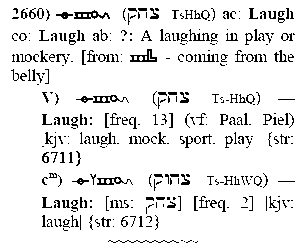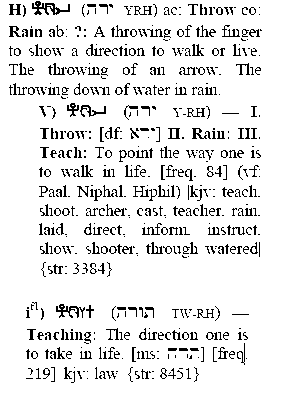| Does Ellen White follow Ancient Hebrew? Q6: Does Ellen White follow Ancient Hebrew? Hypothesis:Are there examples where Ellen White SEEMS not show Ancient Hebrew meaning? Introduction: To be fair in this study, here is an example of a Hebrew word where Ellen White does not explain the Ancient Hebrew meaning directly as it's Ancient Hebrew meaning, but applies the context instead, showing that many Hebrew words have broad meanings. 
(9) : "tsachaq" :laugh, mock.  Strong's 6711. Strong's 6711.
The ancient Hebrew meaning is "Travelling outside beyond" (over the horizon) The verb and noun forms of the same spelling are the same meaning of Hebrew, so note a few examples of this Hebrew word:- Ge 17:17 Then Abraham fell upon his face, and laughed, and said in his heart, Shall a child be born unto him that is an hundred years old? and shall Sarah, that is ninety years old, bear? Jg 16:25 And it came to pass, when their hearts were merry, that they said, Call for Samson, that he may make us sport. And they called for Samson out of the prison house; and he made them sport: and they set him between the pillars. 6 And they rose up early on the morrow, and offered burnt offerings, and brought peace offerings; and the people sat down to eat and to drink, and rose up to play.
{CH 567.3}"But with many of them God was not well pleased: for they were overthrown in the wilderness. Now these things were our examples, to the intent we should not lust after evil things, as they also lusted. Neither be ye idolaters, as were some of them; as it is written, The people sat down to eat and drink, and rose up to play. Neither let us commit fornication, as some of them committed, and fell in one day three and twenty thousand. . . . Now all these things happened unto them for ensamples: and they are written for our admonition, upon whom the ends of the world are come. Wherefore let him that thinketh he standeth take heed lest he fall." 1 Corinthians 10:5-12{PP 317.1} "And they rose up early on the morrow, and offered burnt offerings, and brought peace offerings; and the people sat down to eat and to drink and rose up to play." Under the pretense of holding "a feast to the Lord," they gave themselves up to gluttony and licentious reveling. How often, in our own day, is the love of pleasure disguised by a "form of godliness"! A religion that permits men, while observing the rites of worship, to devote themselves to selfish or sensual gratification, is as pleasing to the multitudes now as in the days of Israel. Notice the Hebrew itself only say they rose up to laugh ! Notice how simple but descriptive the language is. It was a wild party type of laughter.Note that Ellen White does not use the word laugh or mock in her description directly. This is one example against the hypothesis, if one wishes to doubt. The example shows how broad in meaning Hebrew words can be. 
Discussion: Let's test the word "play" in some of other Ellen White contexts:- Like Israel of old, the pleasure lovers eat and drink and rise up to play. There is mirth and carousing, hilarity and glee. In all this the youth follow the example of the authors of the books placed in the ir hands for study. The greatest evil of it all is the permanent effect that these things have upon the character. {AH 524.1} And they rose up early on the morrow, and offered burnt offerings, and brought peace offerings; and the people sat down to eat and to drink, and rose up to play." They drank and feasted, and gave themselves up to mirth and dancing, which ended in the shameful orgies that marked the heathen worship of false gods. {TM 99.3} There is a slight suggestion to the meaning of "tsachaq" meaning to "laugh" or "mock" as this English word "hilarity", but notice the broad meaning of "tsachaq" , to "mock in laughter" in this context also involved sexual revellry. 1Co 10:7 Neither be ye idolaters, as were some of them; as it is written, The people sat down to eat and drink, and rose up to play. 8 Neither let us commit fornication, as some of them committed, and fell in one day three and twenty thousand. Notice Paul parallels "tsachaq" to "sexual revellry", and Ellen White does make note of this as well as a slight suggestion to "laughter" with her use of hilarity and glee.
(10) : "Torah" :Teachings, Rain.  Strong's 8451. Strong's 8451.
Ancient Hebrew pictograph meaning "The marked secure head.Behold the Person!" The Ancient Hebrew shows that "Torah" is what a "Teacher does" "point the correct teachings or directions one should follow". The word is the concept to "throw down" directions, as Rain is the throwing down of living. We would expect "torah" to be a simile of "rain". Ex 16:4 Then said the LORD unto Moses, Behold, I will rain bread from heaven for you; and the people shall go out and gather a certain rate every day, that I may prove them, whether they will walk in my law, or no. Notice torah is a simile of rainDe 11:14 That I will give you the rain of your land in his due season, the first rain and the latter rain, that thou mayest gather in thy corn, and thy wine, and thine oil. This Hebrew word is related to torah, Strong's 3138, "The Active secure head. Behold the Person!" What about the other Hebrew word for "latter rain". Jer 3:3 Therefore the showers have been withholden, and there hath been no latter rain; and thou hadst a whore's forehead , thou refusedst to be ashamed. Notice since torah is a simile of rain, the former rain would be the old testament of Jesus showing the teachings of salvation and the latter rain would be the new testament teachings of Jesus showing the way of salvation, both of these are rain and useful to Christian growth, but they come at different times for our growth. The latter rains of torah have to be in our mind, not as a whore who plays around with two or more rulers. Joe 2:23 Be glad then, ye children of Zion, and rejoice in the LORD your God: for he hath given you the former rain moderately, and he will cause to come down for you the rain, the former rain, and the latter rain in the first month. Notice both former and latter rains of the torah are required for teaching us the salvation of Jesus in Scripture, both OT and NT. 
{4BC 1176.8} A soul corrupted by sin is represented by the figure of a dead body in a state of putrefaction. All the washings and sprinklings enjoined in the ceremonial law were lessons in parables, teaching the necessity of a work of regeneration in the inward heart for the purification of the soul dead in trespasses and sins, and also the necessity of the sanctifying power of the Holy Spirit [Haggai 2:14 quoted] (RH Dec. 19, 1907). {DA 307.2} Christ Himself had given both the moral and the ceremonial law. {Ev 598.2} When type met antitype in the death of Christ, the sacrificial offering ceased. The ceremonial law was done away. But by the crucifixion the law of Ten Commandments was established. Note the parallel statement of Ellen White – sacrificial offering = ceremonial law. {FLB 106.3} From the creation the moral law was an essential part of God's divine plan, and was as unchangeable as Himself. The ceremonial law was to answer a particular purpose in Christ's plan for the salvation of the race. The typical system of sacrifices and offerings was established that through these services the sinner might discern the great offering, Christ. . . . The ceremonial law was glorious; it was the provision made by Jesus Christ in counsel with His Father, to aid in the salvation of the race. The whole arrangement of the typical system was founded on Christ. Adam saw Christ prefigured in the innocent beast suffering the penalty of his transgression of Jehovah's law. Note: The ceremonial law are teaching about the sin-offering, which was completed in Jesus when He became a sin-bearer and thus a sin-offering for our sins.
Discussion: So far Ellen White talks about different types of "torah" making them into two categories, "Ceremonial torah" the sacfice offerings for sin-offering, and "Moral torah" the ten commandments of the Father's love for us. Are there any examples of "torah" as teachings" "rain" across the OT and NT "as throwing down directions, or paths to follow"? Through song and prayer, and lessons from the Scriptures, adapted to the opening mind, fathers and mothers were to instruct their children that the law of God is an expression of His character, and that as they received the principles of the law. law into the heart, the image of God was traced on mind and soul. In both the school and the home, much of the law. teaching was oral, but the youth also learned to read the Hebrew writings; and the parchment rolls of the law. Old Testament Scriptures were open to their study. {CG 32.3} Daniel's parents had trained him in his childhood to habits of strict temperance. They had taught him that he must conform to nature's laws in all his habits; that his eating and drinking had a direct influence upon his physical, mental, and moral nature, and that he was accountable to God for his capabilities; for he held them all as a gift from God and must not, by any course of action, dwarf or cripple them. As the result of this teaching, the law of God was exalted in his mind and reverenced in his heart. {CG 166.4} So Ellen White agrees the "torah" meaning is to "teach" to "point the directions one should go". When the manna was given, the people were tested upon God’s law. The n said the Lord to the children of Israel through Moses, “I will law, or no.”. . . {CTr 109.5} Notwithstanding this special direction of God, some did go out to gather manna on the seventh day, but they found none; and the Lord said unto Moses, “How long refuse ye to keep my commandments and my laws?” That there might be no mistake in the matter, the Father and the Son descended upon Mount Sinai, and there the precepts of His law were spoken in awful grandeur in the hearing of all Israel.—Manuscript 3, 1885. {CTr 109.6} Ellen White acknowledges the meaning of "torah" with "rain" and the directions of the Father and His Son in heaven. If we keep our minds stayed upon Christ, He will come unto us as the rain, as the former and latter rain upon the earth. As the Sun of righteousness, He will arise with healing in His wings. We may grow as the lily, revive as the corn, and grow as the vine. By constantly looking to and patterning after Christ, as our personal Saviour, we shall grow up into Him in all things. Our faith will grow, our conscience will be sanctified. We will more and more become like Christ in all our works and words. Thank God, we shall believe His Word. "The fruit of the Spirit is love, joy, peace, longsuffering, gentleness, goodness, faith, meekness, temperance: against such there is no law. "--Letter 106, 1908, p. 5. (To Elder and Mrs. S. N. Haskell, April 2, 1908.) 
Ellen White theme   |
|
 See for more themes.
See for more themes.